(完整版)一般现在时一般过去时现在进行时过去进行时归纳总结
- 格式:doc
- 大小:65.51 KB
- 文档页数:4
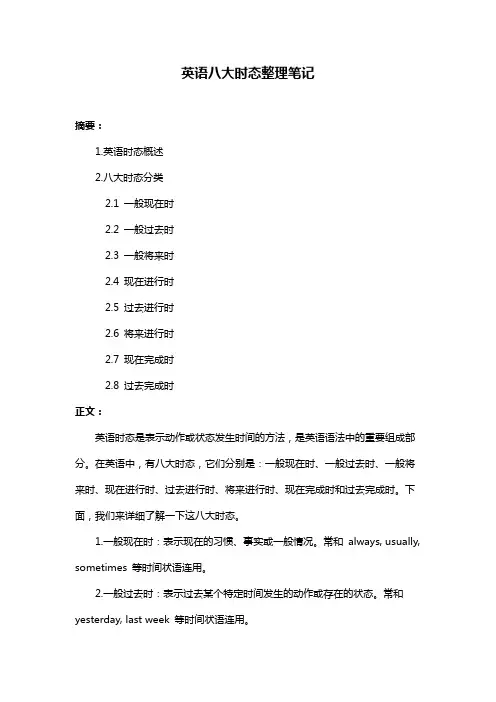
英语八大时态整理笔记摘要:1.英语时态概述2.八大时态分类2.1 一般现在时2.2 一般过去时2.3 一般将来时2.4 现在进行时2.5 过去进行时2.6 将来进行时2.7 现在完成时2.8 过去完成时正文:英语时态是表示动作或状态发生时间的方法,是英语语法中的重要组成部分。
在英语中,有八大时态,它们分别是:一般现在时、一般过去时、一般将来时、现在进行时、过去进行时、将来进行时、现在完成时和过去完成时。
下面,我们来详细了解一下这八大时态。
1.一般现在时:表示现在的习惯、事实或一般情况。
常和always, usually, sometimes 等时间状语连用。
2.一般过去时:表示过去某个特定时间发生的动作或存在的状态。
常和yesterday, last week 等时间状语连用。
3.一般将来时:表示将来某个时间会发生的动作或存在的状态。
常和tomorrow, next week 等时间状语连用。
4.现在进行时:表示现在正在进行的动作或存在的状态。
常和now, today 等时间状语连用。
5.过去进行时:表示过去某个特定时间正在进行的动作或存在的状态。
常和yesterday, an hour ago 等时间状语连用。
6.将来进行时:表示将来某个特定时间将要进行的动作或存在的状态。
常和tomorrow, in an hour 等时间状语连用。
7.现在完成时:表示过去发生的动作对现在造成的影响或结果。
常和already, yet 等时间状语连用。
8.过去完成时:表示过去某个时间点之前已经完成的动作或存在的状态。
常和before, after 等时间状语连用。
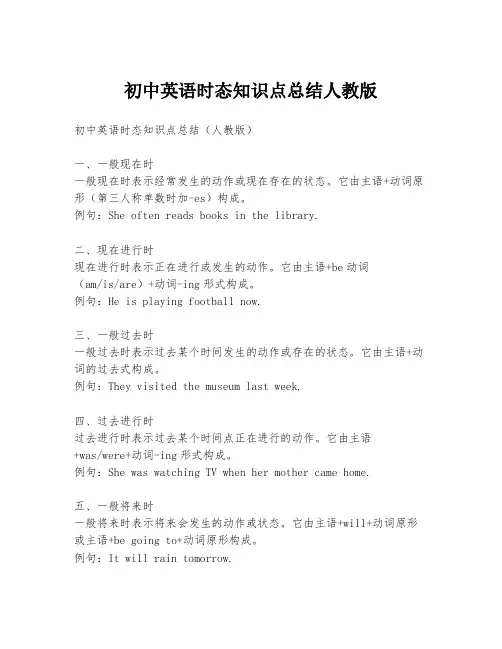
初中英语时态知识点总结人教版初中英语时态知识点总结(人教版)一、一般现在时一般现在时表示经常发生的动作或现在存在的状态。
它由主语+动词原形(第三人称单数时加-es)构成。
例句:She often reads books in the library.二、现在进行时现在进行时表示正在进行或发生的动作。
它由主语+be动词(am/is/are)+动词-ing形式构成。
例句:He is playing football now.三、一般过去时一般过去时表示过去某个时间发生的动作或存在的状态。
它由主语+动词的过去式构成。
例句:They visited the museum last week.四、过去进行时过去进行时表示过去某个时间点正在进行的动作。
它由主语+was/were+动词-ing形式构成。
例句:She was watching TV when her mother came home.五、一般将来时一般将来时表示将来会发生的动作或状态。
它由主语+will+动词原形或主语+be going to+动词原形构成。
例句:It will rain tomorrow.六、将来进行时将来进行时表示将来某个时间点正在进行的动作。
它由主语+will be+动词-ing形式构成。
例句:He will be working at this time tomorrow.七、现在完成时现在完成时表示过去发生的动作对现在造成的影响或结果,或者是从过去开始一直持续到现在的动作。
它由主语+have/has+动词的过去分词构成。
例句:I have finished my homework.八、现在完成进行时现在完成进行时表示从过去某一时间开始,一直持续到现在并可能继续下去的动作。
它由主语+have/has been+动词-ing形式构成。
例句:She has been studying English for five years.九、过去完成时过去完成时表示在过去某个时间点之前已经完成的动作。
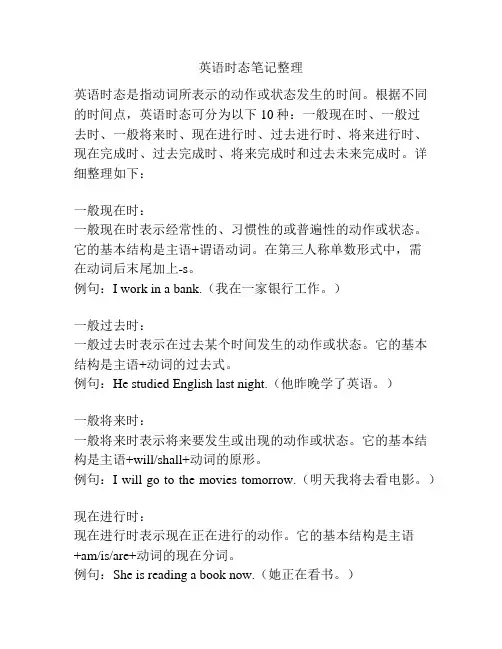
英语时态笔记整理英语时态是指动词所表示的动作或状态发生的时间。
根据不同的时间点,英语时态可分为以下10种:一般现在时、一般过去时、一般将来时、现在进行时、过去进行时、将来进行时、现在完成时、过去完成时、将来完成时和过去未来完成时。
详细整理如下:一般现在时:一般现在时表示经常性的、习惯性的或普遍性的动作或状态。
它的基本结构是主语+谓语动词。
在第三人称单数形式中,需在动词后末尾加上-s。
例句:I work in a bank.(我在一家银行工作。
)一般过去时:一般过去时表示在过去某个时间发生的动作或状态。
它的基本结构是主语+动词的过去式。
例句:He studied English last night.(他昨晚学了英语。
)一般将来时:一般将来时表示将来要发生或出现的动作或状态。
它的基本结构是主语+will/shall+动词的原形。
例句:I will go to the movies tomorrow.(明天我将去看电影。
)现在进行时:现在进行时表示现在正在进行的动作。
它的基本结构是主语+am/is/are+动词的现在分词。
例句:She is reading a book now.(她正在看书。
)过去进行时:过去进行时表示过去某个时间正在进行的动作。
它的基本结构是主语+was/were+动词的现在分词。
通常与表示过去某个时间的状语连用。
例句:I was studying when he called me.(他给我打电话时,我正在学习。
)将来进行时:将来进行时表示将来某个时间正在进行的动作。
它的基本结构是主语+will be+动词的现在分词。
通常与表示将来某个时间的状语连用。
例句:He will be working at 8 o'clock tomorrow morning.(明天早上8点他将在工作。
)现在完成时:现在完成时表示过去某个时间发生的动作对现在造成的影响或结果。
它的基本结构是主语+have/has+动词的过去分词。
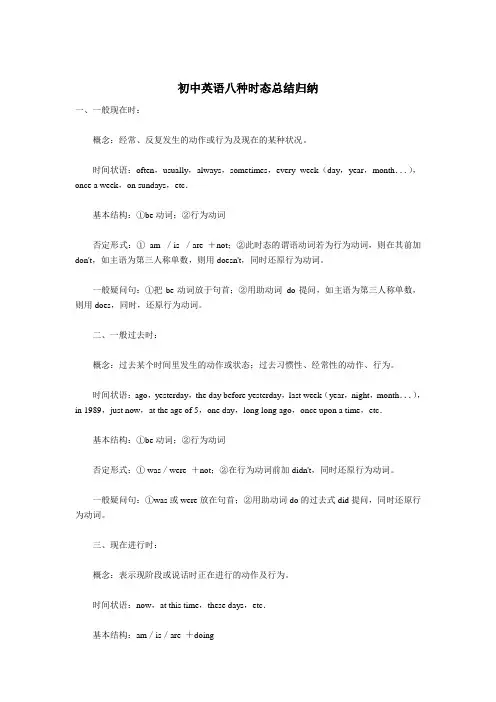
初中英语八种时态总结归纳一、一般现在时:概念:经常、反复发生的动作或行为及现在的某种状况。
时间状语:often,usually,always,sometimes,every week(day,year,month...),once a week,on sundays,etc.基本结构:①be动词;②行为动词否定形式:①am /is /are +not;②此时态的谓语动词若为行为动词,则在其前加don't,如主语为第三人称单数,则用doesn't,同时还原行为动词。
一般疑问句:①把be动词放于句首;②用助动词do提问,如主语为第三人称单数,则用does,同时,还原行为动词。
二、一般过去时:概念:过去某个时间里发生的动作或状态;过去习惯性、经常性的动作、行为。
时间状语:ago,yesterday,the day before yesterday,last week(year,night,month...),in 1989,just now,at the age of 5,one day,long long ago,once upon a time,etc.基本结构:①be动词;②行为动词否定形式:① was/were +not;②在行为动词前加didn't,同时还原行为动词。
一般疑问句:①was或were放在句首;②用助动词do的过去式did提问,同时还原行为动词。
三、现在进行时:概念:表示现阶段或说话时正在进行的动作及行为。
时间状语:now,at this time,these days,etc.基本结构:am/is/are +doing否定形式:am/is/are +not+doing一般疑问句:把be动词放在句首四、过去进行时:概念:表示过去某段时间或某一时刻正在发生或进行的行为或动作。
时间状语:at this time yesterday,at that time或以when引导的谓语动词是一般过去时的时间状语等。
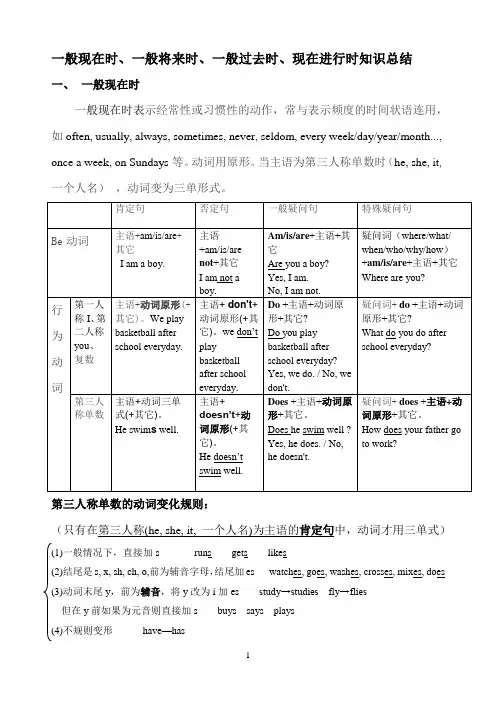
一般现在时、一般将来时、一般过去时、现在进行时知识总结一、一般现在时一般现在时表示经常性或习惯性的动作,常与表示频度的时间状语连用,如often, usually, always, sometimes, never, seldom, every week/day/year/month..., once a week, on Sundays等。
动词用原形。
当主语为第三人称单数时(he, she, it, 一个人名),动词变为三单形式。
第三人称单数的动词变化规则:(只有在第三人称(he, she, it, 一个人名)为主语的肯定句中,动词才用三单式)(1)一般情况下,直接加s runs gets likes(2)结尾是s, x, sh, ch, o,前为辅音字母,结尾加es watches, goes, washes, crosses, mixes, does(3)动词末尾y,前为辅音,将y改为i加es study→studies fly→flies但在y前如果为元音则直接加s buys says plays(4)不规则变形have—has二、一般将来时一般将来时表示将来发生的事。
常与tomorrow, next day/week/month/year..., soon, in a few minutes, the day after tomorrow, in the future等时间状语连用。
Will/shall +动词原形;(shall用语第一人称)be(am/is/are) going to+ 动词原形三、一般过去时一般过去时表示过去某一时候或某一段时间所发生了的事情或存在的状态。
常与过去时间yesterday,ago, this morning,just now,a moment ago,last night / year / week/month,once upon a time,the other day,before,the day before yesterday, in 1989, at the age of five, one day, then(那时), on that day,in the past连用。
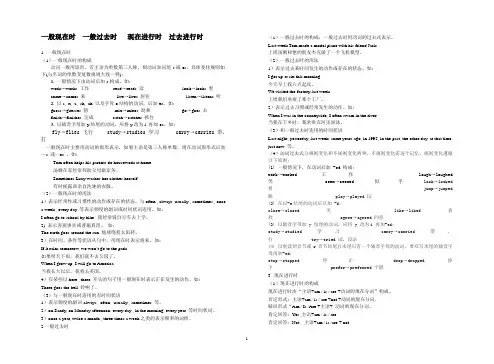
一般现在时一般过去时现在进行时过去进行时1. 一般现在时(1)一般现在时的构成动词一般用原形,若主语为单数第三人称,则动词加词尾-s或-es,具体变化规则如下(与名词的单数变复数规则大致一样):1.一般情况下由动词后加-s构成。
如:work→works 工作read→reads 读look→looks 看come→comes 来live→lives 居住listen→listens 听2.以s, x, z, sh, ch 以及字母o结构的动词,后加-es。
如:guess→guesses 猜mix→mixes 混和go→goes 去finish→finishes 完成catch→catches 抓住3.以辅音字母加y结尾的动词,应将y改为i 再加-es。
如:fly→flies 飞行study→studies 学习carry→carries 带,扛一般现在时主要用动词的原形表示,如果主语是第三人称单数,则在动词原形式后加—s 或—es 。
如:Tom often helps his parents do housework at home.汤姆在家经常邦助父母做家务。
Sometimes Lucy washes her clothes herself.有时候露西亲自洗她的衣服。
(2)一般现在时的用法1)表示经常性或习惯性的动作或存在的状态。
与often , always ,usually , sometimes , once a week , every day 等表示频度的副词或时间状词连用。
如:I often go to school by bike. 我经常骑自行车去上学。
2) 表示客观事实或普遍真理。
如:The earth goes around the sun .地球绕着太阳转。
3)在时间、条件等状语从句中,用现在时表示将来。
如:If it rains tomorrow, we won’t go to the park.如果明天下雨,我们就不去公园了。
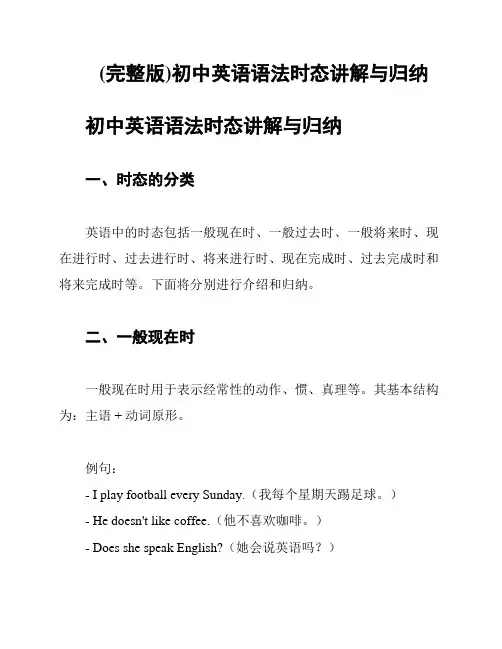
(完整版)初中英语语法时态讲解与归纳初中英语语法时态讲解与归纳一、时态的分类英语中的时态包括一般现在时、一般过去时、一般将来时、现在进行时、过去进行时、将来进行时、现在完成时、过去完成时和将来完成时等。
下面将分别进行介绍和归纳。
二、一般现在时一般现在时用于表示经常性的动作、惯、真理等。
其基本结构为:主语 + 动词原形。
例句:- I play football every Sunday.(我每个星期天踢足球。
)- He doesn't like coffee.(他不喜欢咖啡。
)- Does she speak English?(她会说英语吗?)三、一般过去时一般过去时用于表示过去发生的动作或状态。
其基本结构为:主语 + 动词过去式。
例句:- I went to the park yesterday.(我昨天去了公园。
)- They played basketball last night.(他们昨晚打篮球。
)- Did you finish your homework?(你完成作业了吗?)四、一般将来时一般将来时用于表示将来发生的动作或状态。
其基本结构为:主语 + will + 动词原形。
例句:- I will call you later.(我稍后会给你打电话。
)- She will visit her grandparents next week.(她下周会去看望她的祖父母。
)五、现在进行时现在进行时用于表示现在进行的动作。
其基本结构为:主语 + am/is/are + 动词-ing 形式。
例句:- He is studying in the library now.(他现在正在图书馆研究。
)- They are playing soccer in the park.(他们正在公园里踢足球。
)- Is she watching TV at the moment?(她现在正在看电视吗?)六、过去进行时过去进行时用于表示过去某个时间点正在进行的动作。
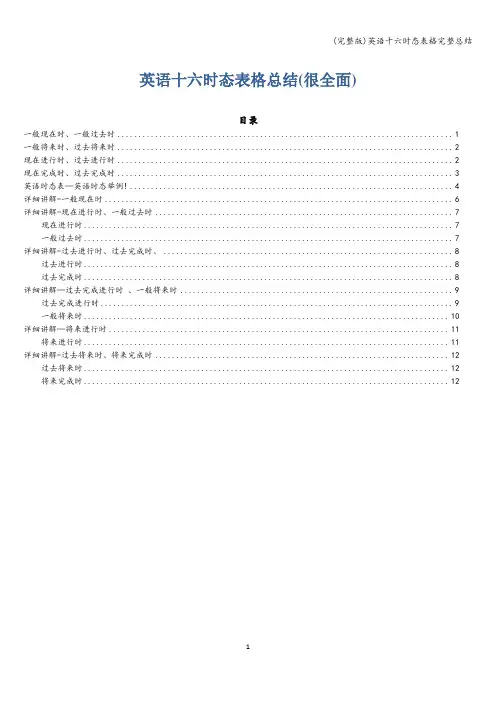
英语十六时态表格总结(很全面)目录一般现在时、一般过去时 (1)一般将来时、过去将来时 (2)现在进行时、过去进行时 (2)现在完成时、过去完成时 (3)英语时态表—英语时态举例! (4)详细讲解-一般现在时 (6)详细讲解-现在进行时、一般过去时 (7)现在进行时 (7)一般过去时 (7)详细讲解-过去进行时、过去完成时、 (8)过去进行时 (8)过去完成时 (8)详细讲解—过去完成进行时、一般将来时 (9)过去完成进行时 (9)一般将来时 (10)详细讲解—将来进行时 (11)将来进行时 (11)详细讲解-过去将来时、将来完成时 (12)过去将来时 (12)将来完成时 (12)英语共有16种时态!常用的有12个:一般现在时、一般过去时、一般将来时、过去将来时、现在进行时、过去进行时、将来进行时、现在完成时、过去完成时、将来完成时、现在完成进行时和过去完成进行时。
其他时态很少单独使用!下面发部分英语时态表吧!希望能对你们有帮助!一般现在时、一般过去时一般将来时、过去将来时现在进行时、过去进行时现在完成时、过去完成时英语时态表—英语时态举例!现在完成时句子结构:主语+have/has doneI have studied English in several different countries.在一些国家,我已经学习了英语.句子结构:主语+had doneI had studied a little Englishbefore I moved to the U。
S.在我搬去美国之前,我已经学习了一点英语.句子结构:主语+will+have doneI will have studied every tense bythe time I finish this course.在我完成这个课程的时候,我已经能完成英语时态的学习了.句子结构:主语+be going to+havedoneI’m going to have studied everytense by the time I finishthis course。
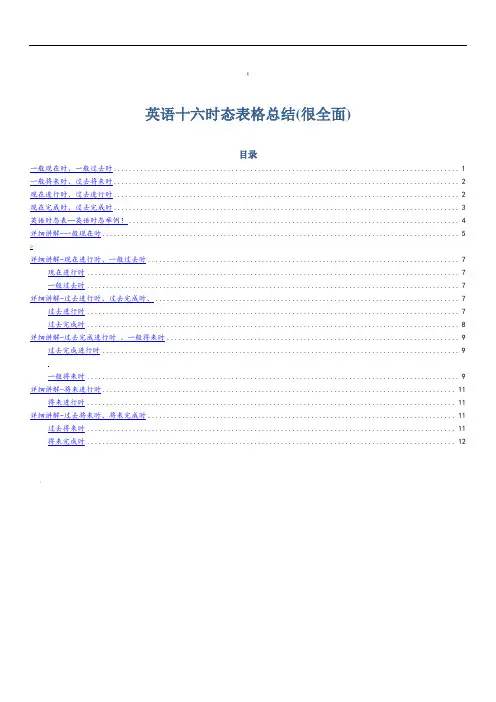
{英语十六时态表格总结(很全面)目录122345 >7 (7) (7) (7) (7) (8) (9) (9)- (9)11 (11)11 (11) (12),英语共有16种时态!常用的有12个:一般现在时、一般过去时、一般将来时、过去将来时、现在进行时、过去进行时、将来进行时、现在完成时、过去完成时、将来完成时、现在完成进行时和过去完成进行时。
其他时态很少单独使用!下面发部分英语时态表吧!希望能对你们有帮助!一般现在时、一般过去时一般将来时、过去将来时现在进行时、过去进行时现在完成时、过去完成时英语时态表—英语时态举例!详细讲解-一般现在时通常以动词原形表示。
主语为第三人称单数时,用现单三形式。
详细讲解-现在进行时、一般过去时现在进行时一般过去时一般过去时通常由动词过去式表示。
一般过去时的否定式、疑问式和简单回答形式要用助动词do 的过去式did, 同时注意实义动词要用原形。
以study 为例,其否定式、疑问式和简单回答形式如下:详细讲解-过去进行时、过去完成时、过去进行时由助动词be 的过去式+现在分词构成。
其中be有人称和数的变化,第一、第三人称单数用was,其他用were.1)过去进行时动词主要表示在过去某一时刻或某一段时间内正在进行或持续进行的动作。
过去进行时经常与过去时配合使用。
例如:This time yesterday, we were having an English lesson. 昨天这个时候,我们正在上英语课。
The teacher was giving us a lesson when Tom walked into the room. 老师在给我们上课时,汤姆走进教室。
While we were having supper, all the lights went out. 我们吃饭的时候,灯灭了。
He was reading while she was setting the table. 她摆桌子时,他在读书。
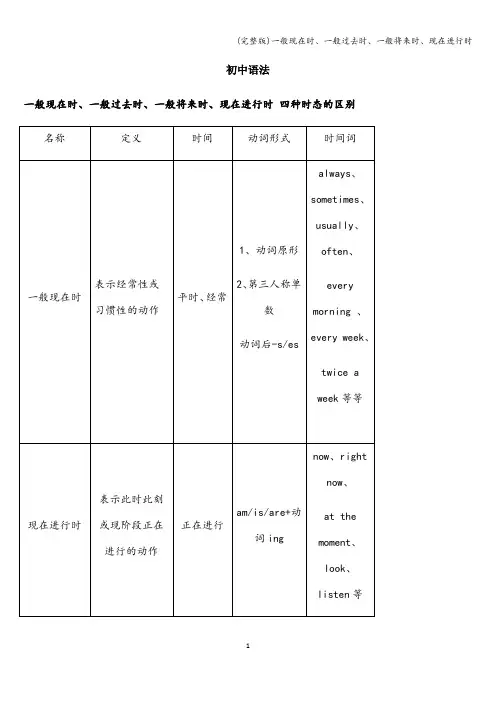
初中语法一般现在时、一般过去时、一般将来时、现在进行时四种时态的区别注意:1、一般现在时——第三人称单数的动词变化规则:1)大多数动词在词尾加“S"如:stop-______ ; make-______ read-______ ; play-______2)以辅音字母加“y”结尾的,要先将“y”变为“i",然后在加“es”如:fly-______ ; carry-______ study-______ ; worry-______3)以“s, x, ch, sh”结尾的,在词尾加“es"如:teach-______ ; watch-______4)以“o”结尾的动词,加“es”如:go-______ do-______2、现在进行时——动词ing形式的变化规则1.一般动词直接在词尾+ing例:read→______ (读) talk→______(交谈) sing→______(唱歌)2。
以不发音e结尾的动词,先去e再加ing例:like→______喜欢 write→______写 skate→______(滑冰)3。
以重读闭音节结尾且末尾只有一个辅音字母的动词,双写末尾字母,再加ing 例:stop→______(停止) get→______(得到)4.少数几个以ie结尾的动词,变ie为f再加ing.例:lie→______(躺、撒谎) tie→______(系、捆绑)3、一般过去时——动词的变化规则(1)一般在动词后加-ed。
如:play-______, offer-______, weigh—______, destroy—______, sign—______(2)在以字母e结尾的动词后,只加-d。
如:like—______, provide-______, hate - ______ date-______(3) 在以“辅音字母+y”结尾的动词后,则改y为i,再加—ed。
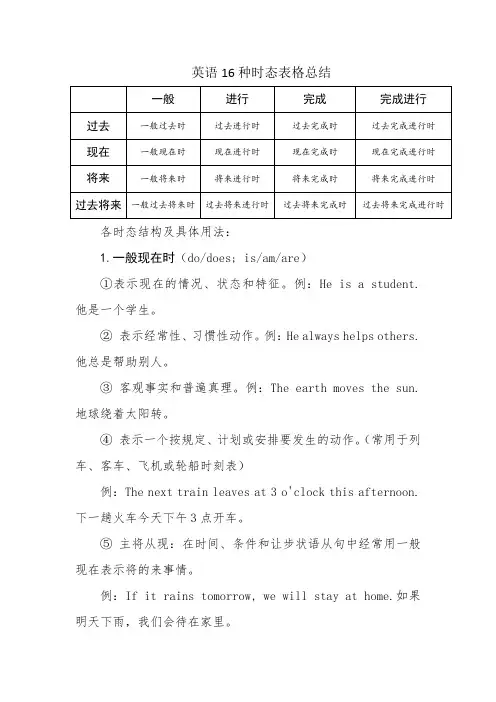
英语16种时态表格总结各时态结构及具体用法:1.一般现在时(do/does; is/am/are)①表示现在的情况、状态和特征。
例:He is a student.他是一个学生。
②表示经常性、习惯性动作。
例:He always helps others.他总是帮助别人。
③客观事实和普遍真理。
例:The earth moves the sun.地球绕着太阳转。
④表示一个按规定、计划或安排要发生的动作。
(常用于列车、客车、飞机或轮船时刻表)例:The next train leaves at 3 o'clock this afternoon.下一趟火车今天下午3点开车。
⑤主将从现:在时间、条件和让步状语从句中经常用一般现在表示将的来事情。
例:If it rains tomorrow, we will stay at home.如果明天下雨,我们会待在家里。
2.现在进行时(am/is/are doing)①表示此时此刻正在发生的事情。
例:He is listning to the music now.他现在正在听音乐。
②表示目前一段时间内一直在做的事情,但不一定此时此刻正在做。
例:I am studying computer this term.这个学期我一直在学习计算机。
③现在进行时可以表示将来的含义。
瞬时动词的进行一定表将来。
例:I am leaving.我要离开了。
持续动词的进行只有有将来的时间状语或有将来语境中才表将来。
例:I am travelling next month.下个月我要去旅行。
④现在进行时与频度副词连用,表示说话者或褒义或贬义的感情色彩。
例:He is always helping others.他总是帮助别人。
(褒义)3.过去进行时(was/ were doing)①表示在过去一个具体的时间正在发生的动作。
例:Mary was listening to light music 10 minutes ago.10分钟前,玛丽正在听轻音乐。
初中六个英语时态总结归纳英语时态是学习英语语法中的重要内容之一,它能够帮助我们准确地描述过去、现在和将来的动作或状态。
在初中阶段,学生通常会接触到六个基本的英语时态,它们分别是一般现在时、一般过去时、一般将来时、现在进行时、过去进行时和将来进行时。
本文将对这六个时态进行总结归纳,帮助读者更好地理解和运用。
一、一般现在时(Simple Present Tense)一般现在时用来表达经常性或习惯性的动作、客观真理、科学事实以及对现在情况的描述。
它的基本形式是主语 + 动词原形(第三人称单数加-s/-es),且没有时间状语的限制。
例如:1. He plays basketball every Sunday.(他每个星期天打篮球。
)2. Water boils at 100 degrees Celsius.(水在100摄氏度沸腾。
)二、一般过去时(Simple Past Tense)一般过去时用来表示发生在过去某个时间的动作或状态。
它的基本形式是主语 + 动词过去式,其中一般过去时的动词过去式有规律和不规律两种形式。
例如:1. She walked to the park yesterday.(昨天她走到了公园。
)2. They saw a movie last night.(昨晚他们看了一部电影。
)三、一般将来时(Simple Future Tense)一般将来时用来表示将来会发生的动作或状态。
它的基本形式是主语 + will + 动词原形,还可以使用be going to + 动词原形的形式。
例如:1. We will have a party tomorrow.(我们明天将举办一个派对。
)2. He is going to study abroad next year.(明年他将出国留学。
)四、现在进行时(Present Continuous Tense)现在进行时用来表示现在正在进行的动作或状态。
小学的四大时态知识点总结小学英语教学中,时态是学生必须掌握的基本语法点之一。
以下是小学阶段学生需要掌握的四大时态知识点的总结:1. 一般现在时(Simple Present Tense)- 用法:表示经常发生的动作或状态,或者表示客观事实。
- 结构:主语 + 动词原形/动词的第三人称单数形式(如:He/She/It + 动词-s/-es)。
- 例句:She goes to school every day.(她每天去上学。
)2. 现在进行时(Present Continuous Tense)- 用法:表示正在进行或发生的动作。
- 结构:主语 + be动词(am/is/are)+ 动词的现在分词形式(-ing)。
- 例句:They are playing football now.(他们现在正在踢足球。
)3. 一般过去时(Simple Past Tense)- 用法:表示过去发生的动作或状态。
- 结构:主语 + 动词的过去式。
- 例句:He visited his grandparents last week.(他上周拜访了他的祖父母。
)4. 一般将来时(Simple Future Tense)- 用法:表示将来发生的动作或状态。
- 结构:主语 + will + 动词原形;或主语 + be going to + 动词原形。
- 例句:She will go to the library tomorrow.(她明天将去图书馆。
)掌握这些基本时态对于小学生来说至关重要,它们是构建句子和表达思想的基础。
在学习过程中,学生应该通过大量的练习和实际应用来加深对这些时态的理解和运用。
同时,老师和家长也应该鼓励学生在日常生活中使用英语,以提高他们的语言能力。
通过不断的练习和应用,学生将能够更加熟练地掌握这些时态,并在英语交流中更加自信。
一般现在时一般过去时现在进行时过去进行时1. 一般现在时(1)一般现在时的构成动词一般用原形,若主语为单数第三人称,则动词加词尾-s或-es,具体变化规则如下(与名词的单数变复数规则大致一样):1.一般情况下由动词后加-s构成。
如:work→works 工作read→reads 读look→looks 看come→comes 来live→lives 居住listen→listens 听2.以s, x, z, sh, ch 以及字母o结构的动词,后加-es。
如:guess→guesses 猜mix→mixes 混和go→goes 去finish→finishes 完成catch→catches 抓住3.以辅音字母加y结尾的动词,应将y改为i 再加-es。
如:fly→flies 飞行study→studies 学习carry→carries 带,扛一般现在时主要用动词的原形表示,如果主语是第三人称单数,则在动词原形式后加—s 或—es 。
如:Tom often helps his parents do housework at home.汤姆在家经常邦助父母做家务。
Sometimes Lucy washes her clothes herself.有时候露西亲自洗她的衣服。
(2)一般现在时的用法1)表示经常性或习惯性的动作或存在的状态。
与often , always ,usually , sometimes , once a week , every day 等表示频度的副词或时间状词连用。
如:I often go to school by bike. 我经常骑自行车去上学。
2) 表示客观事实或普遍真理。
如:The earth goes around the sun .地球绕着太阳转。
3)在时间、条件等状语从句中,用现在时表示将来。
如:If it rains tomorrow, we won’t go to the park.如果明天下雨,我们就不去公园了。
英语语法八大时态总结建议收藏一、一般现在时1. 一般现在时表示经常性或习惯性的动作或状态。
2. 句式:主语 + 动词原形/动词第三人称单数形式3. 例如:She studies English every day.二、一般过去时1. 一般过去时表示过去的某个时间发生的动作或状态。
2. 句式:主语 + 动词过去式3. 例如:They visited the museum last week.三、一般将来时1. 一般将来时表示将来某个时间会发生的动作或状态。
2. 句式:主语 + will/shall + 动词原形3. 例如:I will help you with your homework tomorrow.四、现在进行时1. 现在进行时表示现阶段正在进行的动作。
2. 句式:主语 + am/is/are + 现在分词3. 例如:She is reading a book at the moment.五、过去进行时1. 过去进行时表示过去某一时间正在进行的动作。
2. 句式:主语 + was/were + 现在分词3. 例如:They were playing football when it started to rain.六、现在完成时1. 现在完成时表示过去某个时间开始的动作一直持续到现在或对现在产生影响的动作。
2. 句式:主语 + have/has + 过去分词3. 例如:I have finished my homework.七、过去完成时1. 过去完成时表示在过去某个时间之前已经发生或完成的动作。
2. 句式:主语 + had + 过去分词3. 例如:She had already left when I arrived.八、将来完成时1. 将来完成时表示将来某个时间之前已经发生或完成的动作。
2. 句式:主语 + will/shall + have + 过去分词3. 例如:I will have completed the project by next month.总结回顾英语语法中的八大时态对于学习英语的人来说是十分重要的。
英语的时态语态总结归纳一、英语的时态总论1、英语有十种不同的时态,它们分别是:一般现在时、一般过去时、一般将来时、现在进行时、过去进行时、将来进行时、现在完成时、过去完成时、将来完成时和现在完成进行时。
2、时态的构成:时态由两个部分组成,即时和态。
时是指动词表示的行为发生的时间,态是指动词表示的行为的性质和情况,例如,进行态表示动作正在发生;完成态表示动作已发生;完成进行态表示动作已经发生且正在发生。
二、英语的时态归纳1、一般现在时:(1)表示现在习惯性的动作或存在的状况,例如,他每天早上8点起床;许多动物可以在海里游泳。
(2)表示现在客观真理,例如,太阳是由氢原子组成的;水的沸点是100摄氏度。
(3)表示目前的计划,例如,他本周末要回家;我们明天要去游览新宫。
2、一般过去时:(1)表示过去的习惯性动作或状况,例如,他以前每天早上8点起床;我上学时常跟朋友一起去游泳。
(2)表示过去的发生的事情,例如,他昨天回到家;我上周去参加会议。
(3)表示过去经常或反复发生的事情,例如,他经常和他的老师打电话;我总是在每次考试前担心。
3、一般将来时:(1)表示即将发生的动作或状况,例如,他明天早上起床要9点;我们下周要去海边度假。
(2)表示预定的计划,例如,他明天要回家;我们星期六要参加聚会。
(3)表示将来可能发生的情况,例如,这个孩子将来会很有名;这个项目很有可能会成功。
4、现在进行时:(1)表示正在进行或发生的动作,例如,他正在做家务;我正在学习英语。
(2)表示现在状况,例如,天气正在变凉;成绩正在提高。
5、过去进行时:(1)表示过去正在进行的动作,例如,他昨天晚上正在复习;我过去常常和朋友在一起玩。
(2)表示过去的临时动作,例如,他昨天晚上正在看书;我昨天正在准备考试。
6、将来进行时:(1)表示将来正在进行的动作,例如,他明天晚上正在打乒乓球;我们下星期一正在学习英语。
(2)表示将来临时动作,例如,他明天晚上正在看电视;我们下星期二正在准备考试。
一般现在时一般过去时现在进行时过去进行时1. 一般现在时(1)一般现在时的构成动词一般用原形,若主语为单数第三人称,则动词加词尾-s或-es,具体变化规则如下(与名词的单数变复数规则大致一样):1.一般情况下由动词后加-s构成。
如:work→works 工作read→reads 读look→looks 看come→comes 来live→lives 居住listen→listens 听2.以s, x, z, sh, ch 以及字母o结构的动词,后加-es。
如:guess→guesses 猜mix→mixes 混和go→goes 去finish→finishes 完成catch→catches 抓住3.以辅音字母加y结尾的动词,应将y改为i 再加-es。
如:fly→flies 飞行study→studies 学习carry→carries 带,扛一般现在时主要用动词的原形表示,如果主语是第三人称单数,则在动词原形式后加—s 或—es 。
如:Tom often helps his parents do housework at home.汤姆在家经常邦助父母做家务。
Sometimes Lucy washes her clothes herself.有时候露西亲自洗她的衣服。
(2)一般现在时的用法1)表示经常性或习惯性的动作或存在的状态。
与often , always ,usually , sometimes , once a week , every day 等表示频度的副词或时间状词连用。
如:I often go to school by bike. 我经常骑自行车去上学。
2) 表示客观事实或普遍真理。
如:The earth goes around the sun .地球绕着太阳转。
3)在时间、条件等状语从句中,用现在时表示将来。
如:If it rains tomorrow, we won’t go to the park.如果明天下雨,我们就不去公园了。
When I grow up, I will go to America.当我长大以后,我将去美国。
4)在某些以here , there 开头的句子用一般现在时表示正在发生的动作。
如:There goes the bell .铃响了。
(3)与一般现在时连用的有时间状语1)表示频度的副词always , often , usually , sometimes 等。
2)on Sandy, on Monday afternoon, every day , in the morning, every year 等时间状词。
3)once a year, twice a month , three times a week之类的表示频率的词组。
2.一般过去时(1)一般过去时的构成:一般过去时用动词的过去式表示。
Last week Tom made a model plane with his friend Jack.上周汤姆和他的朋友杰克做了一个飞机模型。
(2)一般过去时的用法1)表示过去某时间发生的动作或存在的状态。
如:I got up at six this morning.今天早上我六点起床。
We visited the factory last week.上周我们参观了那个工厂。
2)表示过去习惯或经常发生的动作。
如:When I was in the countryside, I often swam in the river.当我在下乡时,我常常在河里游泳。
(3)和一般过去时连用的时间状语Last night, yesterday, last week, some years ago, in 1995, in the past, the other day, at that time, just now 等。
(4)动词过去式分规则变化和不规则变化两种。
不规则变化需逐个记忆,规则变化遵循以下原则:(1) 一般情况下,在动词后加 -ed 构成:work→worked 工作laugh→laughed 笑seem→seemed 似乎look→looked 看jump→jumped 跳play→played 玩(2) 在以-e结尾的动词后只加 -d:close→closed 关like→liked 喜欢agree→ag reed 同意(3) 以辅音字母加 y 结尾的动词,应将 y 改为i 再加-ed:study→studied 学习carry→carried 带,扛try→tried 试,设法(4) 以重读闭音节或r音节结尾且末尾只有一个辅音字母的动词,要双写末尾的辅音字母再加-ed:stop→stopped停止drop→dropped 掉下prefer→preferred 宁愿3. 现在进行时(1)现在进行时的构成现在进行时由“主语+am / is / are +动词的现在分词”构成。
否定形式:主语+am / is / are +not +动词的现在分词。
疑问形式“Am / Is /Are +主语+ 动词的现在分词。
肯定回答:Yes ,主语+am / is / are .否定回答:Not , 主语+am / is /are + not .(2)现在进行时的用法1)表示此时此刻正在进行的动作。
如:—What are you doing ? 你在做什么?--I am reading English. 我正在读英语。
2)表示现阶段正在进行的动作或持续的状态。
如:They are studying hard his term.他们这学期学习一直很努力。
3)go , leave, arrive , start等动词现在进行时表示将来。
如:I am going to Beijing this Sunday.本周日我打算去北京。
4) 当时间状词为now , there days 等时或当句子中含有look , listen ,can you see ,can’t you see 之类的暗示词时,要使用现在进行时。
但应注意下列这些动词一般不用于现在进行时态的句子中。
a. 表示感觉的动词,如see, hear等。
b. 表示喜欢或厌恶的动词,如like, love 等。
c. 表示希望的动词,如want, would like 等。
d. 表示状态的动词,如:be 等。
e.表示归属的动词,如:have 等。
f. 表示思维、知识或理解能力的动词,如:know, forget 等。
4. 过去进行时(1)表示过去某一时刻或过去一段时间内正在进行的动作。
常和表示过去的时间状语then ,at that time , this time yesterday ,at ten yesterday等连用,或用另一动作来表示过去的进间。
如:---What were you doing at nine last night?---I was watching TV at that time.——昨天晚上九点你在干什么?——那时我正在看电视。
He was reading when I came in. 当我进来时,他正在读书。
I was doing my homework while my parents were watching TV.当父母看电视的时候,我正在做作业。
(2)过去进行时常和always 等时间副词连用时,表示过去频繁发生的习惯性动作,此时的过去进行时带有一定的感情色彩。
如:Alice was always changing her mind.艾丽丝总含有在改变主意。
(3)注意在含有when或while 引导的时间状语从句的主从复合句中过去进行时的运用。
1) 主句中的动作先于从句中的动作发生,且进行的时间较长时,主句用过去时进行时(从句常用一般过去时)。
2)从句中的动作先于从句中的动作发生,且进行的时间较长时,从句用过去进行时(主语用一般过去时)。
3)若主、从句动作开始的时间不存在先后关系(即同时发生)或无所谓先后时,主从句可同时使用过去进行时,此时的时间状语从句一般由while 来引导。
5. 现在分词构成1 一般情况下直接加ing think---thinkingsleep---sleeping study---studying speak---speaking say---saying2 以不发音的字母e结尾的单词,去掉字母e,再加ingmake---making come---coming take---taking leave---leavingwake---waking have---having3以重读闭音节结尾,呈现“辅,元,辅”结构的动词,先双写末尾的辅音字母,再加ing stop---stopping sit---sitting run---runningforget---forgetting4 以ie结尾的动词,把ie改为y ,再加ing die---dy lie---lying 5以重读闭音节结尾,呈现“辅,元,辅”结构的动词,先双写末尾的辅音字母,再加ing 。
初中学过的这类词有:bigin,cut, get, hit, run, set, sit, spit, stop, swim, beg, drop, fit, nod, dig, forget, regret, rid, 等。
travel虽然重读第一音节,词尾音节不重读,但是现在分词仍要双写末尾辅音字母,然后再加ing,如:travel---travelling.初中阶段此类词只有这一个。
练习:一、单项填空1. There ___many students in the library after school every day.A. hasB. haveC. isD. are2. The football team played well, but they didn’t ____the competition.A. scoreB. doC. succeedD. win3. They ____her to the party, so she was very happy.A. inviteB. invitedC. will inviteD. are inviting4. Diana, together with her friends, _____Chinese in China.A. studyB. have studiedC. studiesD. are studying5. They had to ____the 800—meter race because of the bad weather.A. put onB. put offC. get onD. get up6. This silk dress ____ so smooth. It’s made in China.A. tastesB. smellsC. soundsD. feels7. My friend_____ me. I have to leave now.A. waits forB. waited forC. is waiting forD. was waiting for8. Mike didn’t get wet because his teacher ____ him an umbrella.A. lentB. discoveredC. borrowedD. taught9. ---Shush, be quiet! The baby _____in the next room.---OK, Sorry.A. sleepB. sleptC. sleepsD. is sleeping10.---Hi , Tony. The milk shake _____good!---I’m glad you like it.A. soundsB. fallsC. goesD. tastes11. He ___his bicycle when it began to rain.A. was ridingB. is ridingC. has riddenD. rides12. ---What does your sister like doing in her spare time?----She ___watching TV.A. likesB. likedC. has likedD. had liked13. ---What a nice model ship!----Thank you, It ___me three days to make it.A. paidB. spentC. tookD. wasted14. ---Can I help you?---I bought this watch here yesterday, but it ____work.A. won’tB. didn’tC. doesn’tD. wouldn’t15.---Dinner is ready , Help yourself !---Wow! It ____delicious. Could you please tell me how to cook it?A. tastesB. looksC. soundsD. feels16. The summer vacation will begin next week. David ___ to stay with us.A. will be comingB. comesC. cameD. is coming17. I____on the computer when Jim came to see me yesterday evening.A. drawB. drewC. was drawingD. am drawing18. ---Where is Frank now?---He ____his bike in the yard.A. fixes upB. fixing upC. is fixing upD. fixed19. He’ll send us a message as soon as he ___in Sichuan.A. is arrivingB. will arriveC. arrivedD. arrives20. The children ____ a P.E. class on the playground when it suddenly began to rain.A. haveB. are havingC. hadD. were having21. ---Did you see a girl in white pass by just now?---No, sir .I ___a newspaper.A. readB. was readingC. would readD. am reading22. Again and again the doctor ___the crying girl, but he couldn’t find out what was wrong with her.A. looked overB. looked afterC. looked forD. looked out23. The teacher told the students that the earth ____round, not flat.A. wasB. isC. has beenD. is being24. He turned off the light and then ____the classroom.A. leavesB. will leaveC. is leavingD. left25. Coffee is ready .How nice it ___ ! Would you like some?A. looksB. smellsC. soundsD. feels26. Oh, the milk ____strange. Do you think it’s OK to drink?A. was tastedB. tastedC. is tastingD. tastes二、用括号内动词的适当形式填空。